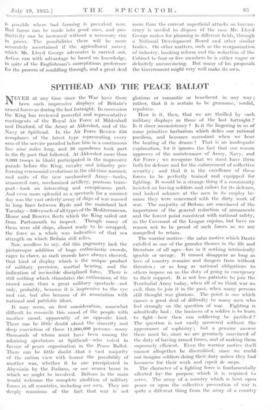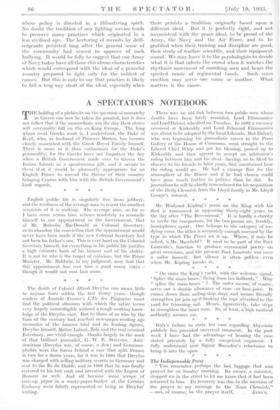SPITHEAD AND THE PEACE BALLOT
NEVER at any time since the War have there been such impressive displays of Britain's armed forces as during the last fortnight. In succession the King ' has reviewed powerful and representative contingents of the Royal Air Force at Mildenhall and Duxford, of the Army at Aldershot, and of the Navy at Spithead. In the Air Force Review 856 aeroplanes of the latest type representing every armof the service paraded before him in a continuous line nine miles long, and 20 squadrons took part in the fly past that followed. At Aldershot more than 9,000 troops in khaki participated in the impressive parade before the King, cavalry and infantry per- forming ceremonial evolutions in the old-time manner, and units of the new mechanized Army—tanks, armoured cars, mechanized artillery, pontoon trans- port—took an interesting and conspicuous part. And even more splendid as a spectacle for a summer day was the vast orderly array of ships of war massed in long lines between Ryde and the mainland last Tuesday-160 vessels of all types of the Mediterranean, Home and Reserve fleets which the King sailed out from Portsmouth to inspect. Though many of them were old ships, almost ready to be scrapped, the force as a whole was indicative of that sea strength on which Britain still relies.
Nor, needless to say, did this pageantry lack the picturesque addition of huge enthusiastic crowds,' eager to cheer; as such crowds have always cheered,, that kind of display which is the unique • product of military precision, martial bearing, and the indication of invincible disciplined force. There is still nothing which stimulates the enthusiasm of the crowd more than a great military spectacle--not only, probably, because it is impressive to the eye and ear, but also because of its association—with national and patriotic ideas.
It may seem, on first consideration, somewhat difficult to reconcile this mood of the people with. another mood, apparently of an opposite kind; There can be little doubt about the sincerity and deep conviction of those 11,000,000 persons—many thousands of -whom must have been among the admiring spectators at Spithead—who voted in favour of peace organization in the Peace. Ballot. There can be little doubt ,ithat a vast majority of the nation view with horror the possibility of another , war, •whether it be one precipitated in Abyssinia by the Italians, or one nearer' home in which we might be involved: Britons in the inain would welcome the complete abolition of • military forces in, all• countries, including our own. They are deeply eOnscious of the fact that war is not glorious or romantic or beneficent in any way ; rather, that it is certain to be gruesome, "sordid, repulsive. • How is it, then, that we are thrilled by such military displays as those of the last fortnight ? Is it sheer inconsistency ? Is it the lingering in us of some primitive •barbarism which defies our rational pacifism, and becomes ascendant when we hear the beating of the drums ? That is an inadequate explanation; for it ignores the fact that our reason approves of the maintenance of Army, Navy, and Air Force ; we recognize' that we Must have the •M both for defence and for the enforcement of collective security ; and that it is the excellence of these forces to be perfectly trained and equipped for fighting. It would be a strange thing if a community insisted on having soldiers and sailors for its defence, and looked askance at the men in its employ be- cause they were concerned with the dirty work of war. The majority of Britons are convinced of the importance of the general reduction of armaments and the lowest point consistent with national safety, as the Covenant of the League enjoins, but have no reason not to be proud of such forces as we are compelled to retain.
The warrior motive—the .saius motive which Dante extolled as one of the grander themes in the life and literature of all ages—has in it nothing intrinsically ignoble or savage. It Cannot disappear as long as love of 'country remains and dangers from Without threaten;' or as long as • national 'obligations to others impose on Us the duty of going in emergency • to their. support. It is not less patriotic to join the . Territorial Army today, when all of us think -war an evil, than to join it in the past, when many persons still thought war glorious. The point is one which causes a good deal of difficulty to many men who - feel strongly on -the question, of war. Fighting is admittedly bad.; the business of a soldier is•to.learn to light—how 'then can soldiering be 'justified ? The •question is not easily -answered without the appearance of sophistry ; but a genuine answer: there must be, since we are. genuinely convinced of the duty of having armed forces, and, of making them supremely efficient. Even the warrior motive itself cannot altogether he discredited,. since we mill& not imagine soldiers doing their duty unless they had! keenness for their work and esprit- de carps. • The character of a fighting force is fundamentally. affected bYli the purpose which it • • is :required to , ,• serve. • The army of a country which is bent 'upon peace or upon the 'collective preventiOri. of •war is quite a different thing from the army of a country .. whose policy is directed in a filibustering spirit. No doubt the tradition of any fighting service tends to preserve many practices which originated in a less civilized age. The hectoring of recruits by drill- sergeants persisted long after the general Sense of the community had ceased to approve of such ,bullying. It would be folly to suggest that our Army or Navy today have all those chivalrous characteristics • which • would correspond with the ideal of a peaceful country prepared to fight only for the noblest , of causes, But this is only to ay that practice is likely to fall a long way short of the ideal, especially when there persists a tradition originally based upon a different ideal. But it is perfectly right, and not inconsistent with the peace ideal, to be proud of the Army, the Navy and the Air Force, and to be gratified when their training and discipline are good, their study of warfare scientific, and their equipment sound. We may leave it to the psychologists €0 decide what it is that infects the crowd when it -Watches the rhythmic movement of marching 'Men and hears the spirited music of regimental bands. Such mass emotion may serve one cause or another. What matters is the cause.



























































 Previous page
Previous page